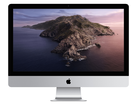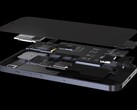Upgradability is a great feature of personal computers. It prolongs the life-cycle, can potentially save the user money and it can make the computer more useful and data recoverable. Unfortunately, hardware upgradability seems to be going the way of the dodo for many products. Almost no smartphone offers removable batteries anymore and many do not have microSD slots. And the RAM of many laptops is soldered these days.
Apple is probably the least upgrade-friendly manufacturer. Not only is the RAM soldered on all modern MacBooks, the SSD is as well - which is still very uncommon over in the Windows laptop world. It is even more unprecedented when it comes to desktop PCs.
Still: Apple's war on upgradability carries over to this area as well, as the new 27 inch Apple iMac 2020 has its SSD soldered to the logic board. Older models contained the Apple Fusion drive, a SSD/HDD combination that was upgradable. The new iMac Late 2020 drops this feature in favor of completely soldered SSD storage.
For users, this makes picking the right storage capacity even more essential and it also diminishes the usefulness of the less expensive models with just 256 GB. Storage can only be expanded with an external SSD or via the SD card slot.
Also, moving to soldered storage can potentially put the user's data in jeopardy: Since the SSD is linked with the logic-board that carries the Apple T2 security chip, a logic board defect also means that the SSD is gone. Regular back-ups are thus highly recommended.

















